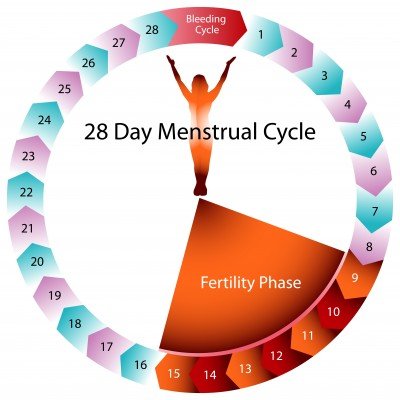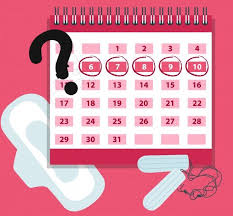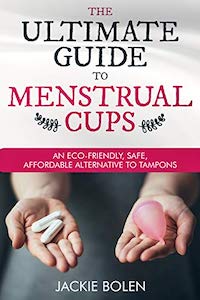
Why is my menstrual cycle getting shorter?
The average menstrual cycle length is 28 days, but it can vary from 21-35 days. Here’s what happens: your body prepares for pregnancy, but if you don’t get pregnant, then the uterine lining is shed and bleeding occurs.
A 21 day, or a 35 day cycle isn’t a bad thing, but even shorter, or longer than that can signal a problem. Have a quick visit with your doctor.
But, why is your menstrual cycle getting shorter and shorter? For example, maybe you have a regular 28-day cycle for years, but then you suddenly start to have 25-day cycles? Let’s find out!
Table of Contents
My Menstrual Cycle is Getting Shorter! Why?
There are a number of reasons for a menstrual cycles getting shorter. Keep in mind that there’s no one single test to find out what’s happening with your doctor. It may take some time and effort to figure out what’s wrong so be sure to check in with your doctor or other medical professional.
Some of the main reasons for a woman’s cycle getting shorter include the following.
#1: Birth Control
Have you recently started, or switched birth control? This can have an impact on menstrual cycle length. Check with your doctor for more details about what you can expect on the specific pill you’re using. Some of these pills stop periods altogether, while others can impact the length of your cycle.
There are some hormonal birth control pills approved by the FDA (food and drug administration) that can actually help regulate your cycle, so check with your family doctor about this.
#2: Hormonal Problems
Certain conditions can affect the hormones that regulate menstruation. For example, thyroid problems. These kinds of things can occur at any age. Your family doctor will be able to help you manage this, and you may feel otherwise healthy.
#3: Perimenopause
It’s normal for perimenopausal periods to be quite irregular due to changing hormone levels (progesterone and estrogen). Really, just about anything can happen during this time before menopause! Shorter periods, longer periods, heavier periods with a lot of blood loss, lighter flow, spotting, late periods, or a change in cycle length. You may also notice weight gain or loss, increased PMS, breast tenderness and problems with sleep, depression, lower sex drive, among other things.
A shorter length of time between cycles is actually thought to be one of the first signs that you’re approaching menopause, which happens for most people around 51 or 52. Your ovaries are beginning to show signs of aging when this happens and you may be experiencing the first stages of perimenopause.
#4: Just after Puberty
Like perimenopause, fluctuating hormones can be responsible for irregular periods in teens just after puberty. It takes most people a few years for their periods to become more normalized.
#5: Infections and Diseases
There are a number of different medical conditions that can have an affect on menstrual cycle length. Check with your doctor if you’re starting to have a shorter menstrual cycle to rule out some of the more serious ones.
Many of these things will results in abdominal pain, or painful periods.
#6: Certain Medications
When you go in for a check-up, let your doctor know if you’re on any medication. Some of them can impact cycle length. For example, antidepressants. This is particularly true if you’ve just started a new medication and your body may be adapting to it.
#7: Eating Disorders or Excessive Exercise
Eating disorders or exercising beyond normal limits can cause periods to become more irregular. In general, both of these things can cause periods to become lighter, further apart, or non-existent. However, just about anything can happen when the reproductive hormones are in a state of flux.
#8: Polycystic Ovary Syndrome (PCOS)
One common cause of very irregular periods, including a very short menstrual cycle is PCOS.
#9: Pelvic Inflammatory Disease (PID)
One of the things that can happen with untreated STI’s is that they can develop into PID. It’s a serious infection that needs treatment by a doctor. It can cause irregular bleeding, including a shorter cycle, as well as pain during sex.
It’s often caused by an STI that is left untreated, which can lead to this more serious condition.
#10: Fibroids or Polyps
These are non-cancerous growths is the uterus which can cause irregular periods. They usually result in bleeding that is heavier and lasts longer than normal.
#11: Cycling Up with Someone Else
Are you hanging around a female friend, housemate or daughter a lot? There is the tendency for cycles to match up, which may mean that your cycle is getting shorter to adapt to the woman you’re spending lots of time with.
#12: Stress
Excessive amounts of stress in women over a long period of time can do all kinds of things to your menstrual cycle, including making it shorter.
#13: Cervical Cancer
One of the symptoms of cervical cancer may be irregular periods, including periods with a lot of blood loss. That’s why it’s important to check in with your doctor when you notice changes to your menstrual cycle. Some other symptoms include pain in the legs, pelvis or back, lack of appetite or weight loss, abnormal vaginal discharge and something unusual on your pap smear.
Prevention and early detection is key, so be sure to get regular pap tests, and if you’re eligible, the HPV vaccine.
#154: Diabetes
If you have diabetes, you may have the experience of your periods becoming quite irregular. This is normal, and it can be a struggle to regulate them throughout the rest of your menstruating life. Check in with your doctor to find out if there’s a solution for you, as well as some tips on managing this problem.
Learn More about Menstrual Cycles
You can find out more about the various menstrual cycle phases here.
Short Menstrual Cycle and Fertility
If you’re trying to get pregnant, but have a shorter than usual menstrual cycle, you’ll probably want to know how this impacts your fertility.
Has Ovulation Occurred?
If your menstrual cycle is very short, it’s possible that ovulation has occurred too quickly. Remember that you’ll bleed after an egg has been released from the ovaries, but not fertilized.
And of course, you need to have an egg for the sperm to meet in order to get pregnant. If you skip a period, it may be that you’re pregnant, or that you may not have ovulated. There are also other reasons for this problem as well.
Studies show that people who have cycles shorter than 26 days have a harder time getting pregnant. A big part of the problem is that the lining in the uterus isn’t fully developed enough to support a pregnancy.
Are you Approaching Menopause?
Another reason why you may have shorter menstrual cycles is that you’re approaching menopause, which will make it more difficult for you to get pregnant.
It’s difficult to tell if the lower fertility rate associated with a shorter menstrual cycle is related to this happening more frequently to older women, or not.
Is it Related to Poor Egg Quality?
Something that can happen if you have a short menstrual cycle is that your body may be releasing eggs that are of lower quality than people with a longer cycle.
The ideal day for ovulation in a cycle is on day 14. If earlier, the egg may not be mature enough yet, and it will be difficult to get pregnant, or sustain a pregnancy with this egg.
Short Cycles and Pregnancy: Higher Rates of Miscarriage
If you do happen to get pregnant when you have a very short menstrual cycle, there is some bad news for you. You’ll be at a higher risk of miscarriage than people with longer cycles.
I’m Not Sure How Long My Cycle Is!
Menstrual cycle getting shorter: I have no idea! Is it? Some people know exactly when they’ll bleed, while others only have a vague awareness of that time of the month.
Do you only have a vague idea of how long your cycle is, or how many days there are between periods? You’re not alone. Most people don’t know.
A menstrual cycle is measured from the first day of bleeding until the first day of bleeding next month.
A super simple way to track your cycle to find out if it’s getting shorter is to use your phone calendar. When you start your period, mark it with an icon in your phone. Then, keep doing it for a few months and you’ll know precisely how long your menstrual cycle is. Also be sure to include things like blood clots, and how heavy your flow is for each day.
Also, did you have any pain or abnormally heavy menstrual cramps? Did you experience mood swings, etc.? Be sure to write this information down!
Alternatively, consider using a phone app to track your period. It’s super handy, and kind of fun too.
Use a phone app to track your period.
What Should I do about My Shorter Menstrual Cycle?
Is there anything you can do about a menstrual cycle that is getting shorter and shorter? Maybe.
It really depends on the underlying condition that is causing it. It’s impossible to give any sort of specific advice about this over the Internet, so please check with your doctor.
Remember, you should see your doctor any time there is something not quite right about your periods, or if it suddenly starts to change. It could be a sign of a serious problem that is responsible for the changes.
Beyond that, there are a few home remedies you can try out for an irregular period.
My Period is Getting Shorter!
Maybe you normally bleed for 5 days, but find that it’s now 3 or 4 days. Is this a problem? It may seem like good news!
There are actually some serious, underlying reasons why this might be happening and we recommend checking with your doctor about it.
More details here: My Period is Shorter than Usual.
Menstrual Cup Shorter Period

Will I have a shorter period with a menstrual cup?
There are some menstrual cup companies out there who say that using a menstrual cup can shorten your period. Is this really a thing? Let’s find out.
A menstrual cup is a device that is designed to collect menstrual fluid. The way it works is that it only collects what’s already flowing out of your uterus, through your cervix and into your vaginal canal (where the menstrual cup sits).
This in no way interferes with your flow. It’s just not possible. One reason why people might think that a menstrual cup is causing them to have a shorter period is because they can wear the cup for longer.
Perhaps on the last day of their period, they leave the cup in for 12 hours, 2-3x in a row. They then look in the cup and find that there’s very little fluid. It would be the same thing with a tampon, but you’d just have to change it sooner because of the risk of toxic shock syndrome.
What about Tampons or Pads?
There are some companies out there (who shall remain unnamed!) that state that their tampons or pads can have an impact on your menstrual cycle. This just isn’t true. There are no studies which show that feminine hygiene products have any sort of impact on your cycle.
I Don’t Have Periods: What’s Wrong?

Learn more about Amennorhea, or lack of menstruation
Maybe instead of your menstrual cycle getting shorter, you don’t have periods at all or they are so light that they’re barely noticeable. If you’re older than 15, but have never gotten your period, you’re considered to have Primary Amenorrhea.
You’re considered to have this condition as well if you’ve started your period, but have now missed three in a row. This is called Secondary Amenorrhea.
There are a number of reasons for this condition, but the most common ones are pregnancy and menopause. There are also some more serious conditions associated with lack of periods, so be sure to check in with your doctor for a proper care, diagnosis and treatment options.
Learn more here missed periods here: Amenorrhea, Causes, Treatments and Risk Factors.
Menstrual Cycle Getting Shorter: Have your Say!
Comments or questions about a shorter menstrual cycle? Leave a comment below and share your thoughts with us. Also be sure to give this article a share on Facebook, Twitter, or Pinterest.






